人教新目标(Go for it)版八年级下册英语期中复习课件(101张PPT)
文档属性
| 名称 | 人教新目标(Go for it)版八年级下册英语期中复习课件(101张PPT) |

|
|
| 格式 | zip | ||
| 文件大小 | 1.7MB | ||
| 资源类型 | 教案 | ||
| 版本资源 | 人教新目标(Go for it)版 | ||
| 科目 | 英语 | ||
| 更新时间 | 2020-04-15 00:00:00 | ||
图片预览

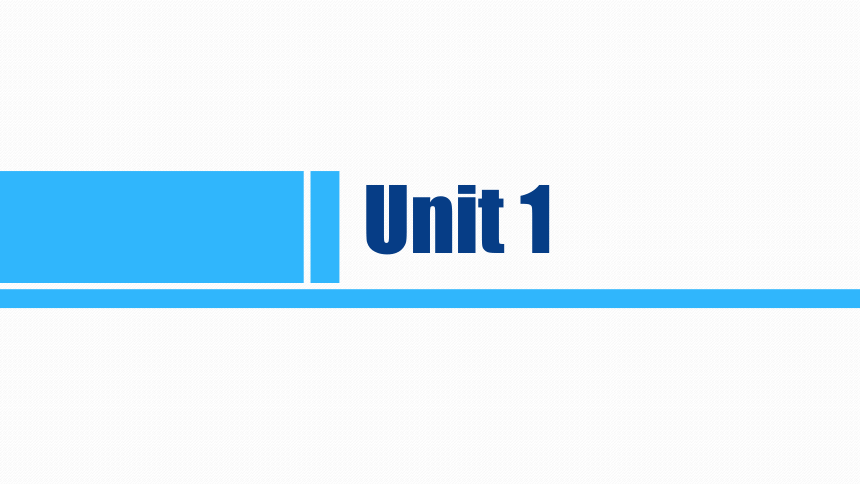
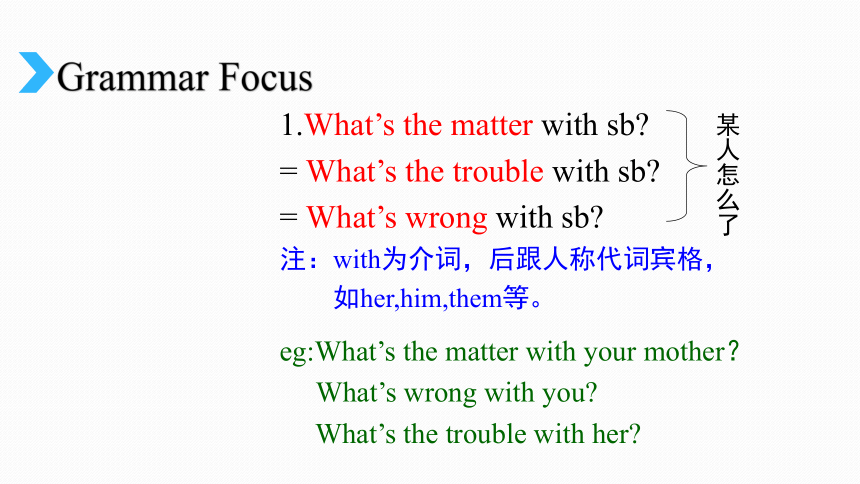
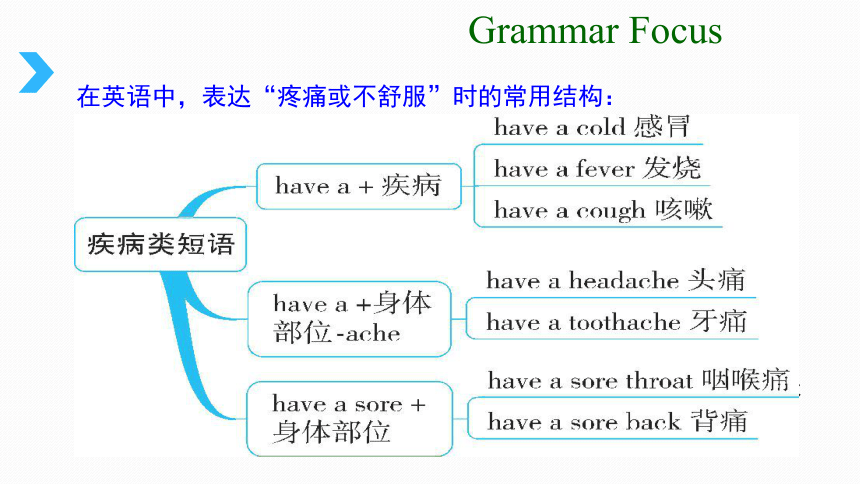
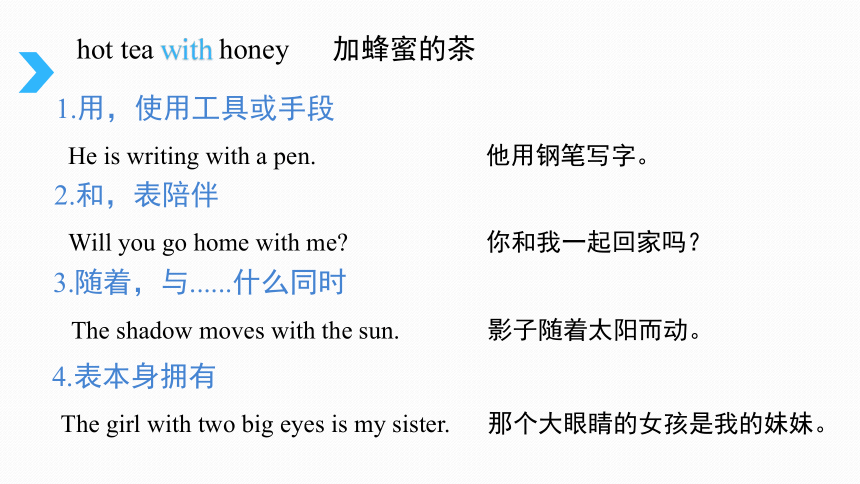
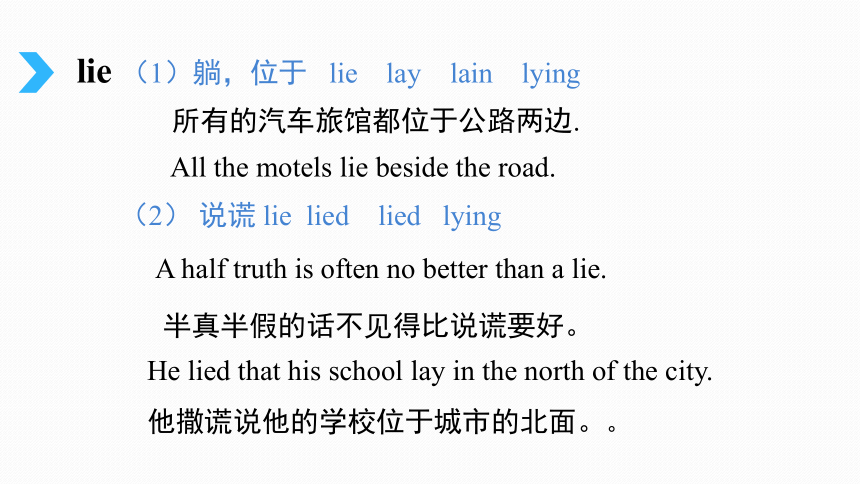
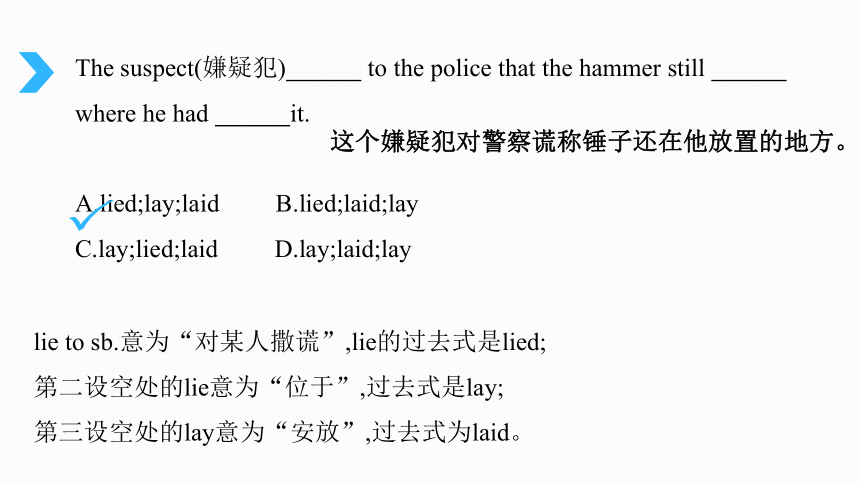

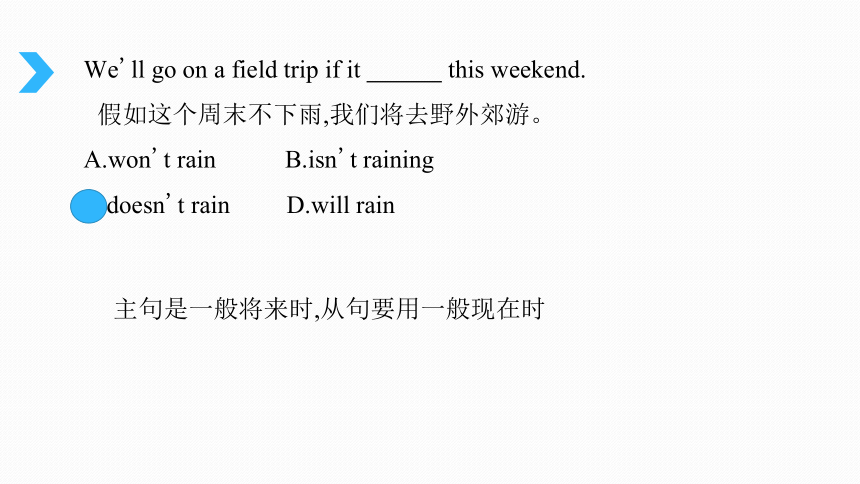
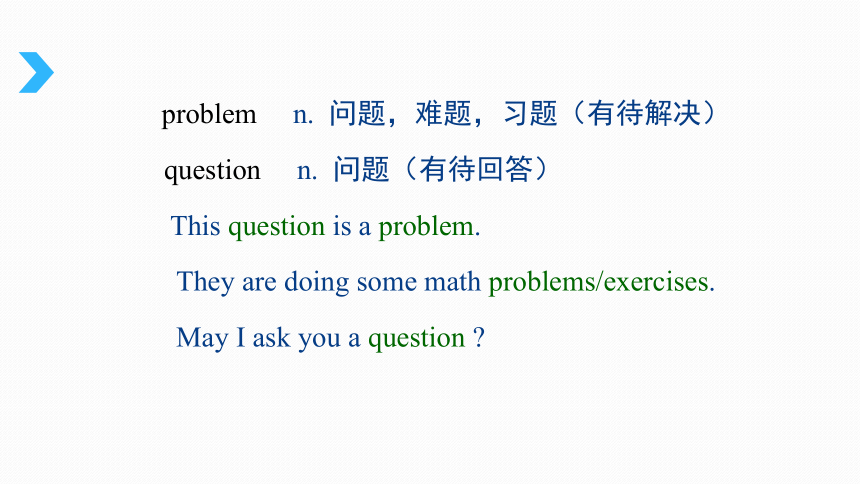
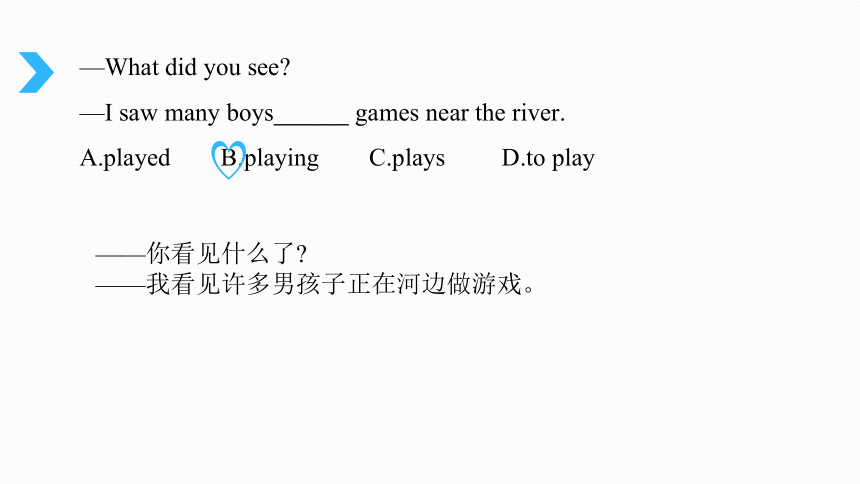
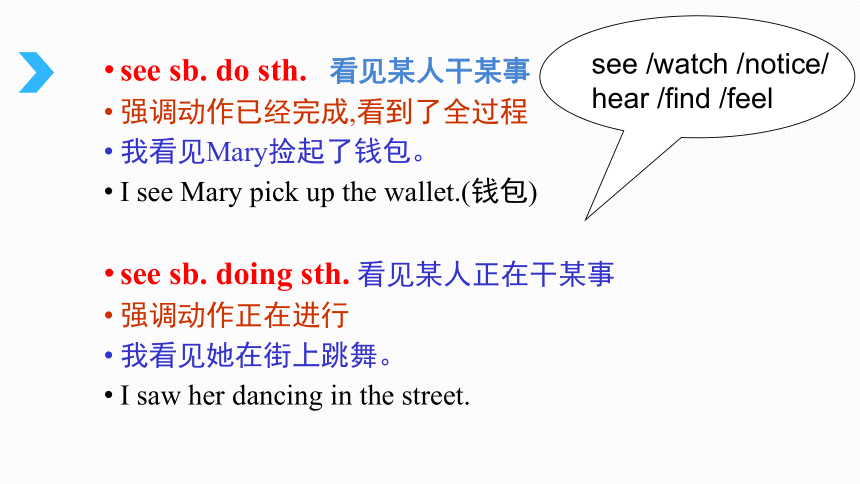
文档简介
(共104张PPT)
八下期中复习
Unit 1
Grammar Focus
1.What’s the matter with sb?
= What’s the trouble with sb?
= What’s wrong with sb?
注:with为介词,后跟人称代词宾格,
如her,him,them等。
eg:What’s the matter with your mother?
What’s wrong with you?
What’s the trouble with her?
某人怎么了
Grammar Focus
在英语中,表达“疼痛或不舒服”时的常用结构:
(1)主语+have/has+a 病症
have a cold/fever
(2)主语+have/has+a+sore+发病部位
sore 是一个独立的形容词,指的是身体某一部位的酸痛。如:sore back, sore throat,sore back,sore neck.
(3)主语+have/has+a+部位-ache
-ache作后缀,常与表示身体部位的名词合成一个新词,表身体某部位疼痛,如:toothache , headache , stomachache .
hot tea with honey 加蜂蜜的茶
1.用,使用工具或手段
He is writing with a pen. 他用钢笔写字。
2.和,表陪伴
Will you go home with me? 你和我一起回家吗?
3.随着,与......什么同时
The shadow moves with the sun. 影子随着太阳而动。
4.表本身拥有
The girl with two big eyes is my sister. 那个大眼睛的女孩是我的妹妹。
lie (1)躺,位于 lie lay lain lying
All the motels lie beside the road.
所有的汽车旅馆都位于公路两边.
(2) 说谎 lie lied lied lying
A half truth is often no better than a lie.
半真半假的话不见得比说谎要好。
He lied that his school lay in the north of the city.
他撒谎说他的学校位于城市的北面。。
The suspect(嫌疑犯) ???? to the police that the hammer still ???? where he had ????it.
A.lied;lay;laid B.lied;laid;lay
C.lay;lied;laid D.lay;laid;lay
lie to sb.意为“对某人撒谎”,lie的过去式是lied;
第二设空处的lie意为“位于”,过去式是lay;
第三设空处的lay意为“安放”,过去式为laid。
这个嫌疑犯对警察谎称锤子还在他放置的地方。
We will go to the Great Wall if it is fine tomorrow.
如果明天天气好,我们会去长城。
We'll go on a field trip if it ???? this weekend.
A.won't rain B.isn't raining
C.doesn't rain D.will rain
假如这个周末不下雨,我们将去野外郊游。
主句是一般将来时,从句要用一般现在时
problem n. 问题,难题,习题(有待解决)
question n. 问题(有待回答)
This question is a problem.
They are doing some math problems/exercises.
May I ask you a question ?
—What did you see?
—I saw many boys ???? games near the river.
A.played B.playing C.plays D.to play
——你看见什么了?
——我看见许多男孩子正在河边做游戏。
see sb. do sth. 看见某人干某事
强调动作已经完成,看到了全过程
我看见Mary捡起了钱包。
I see Mary pick up the wallet.(钱包)
see sb. doing sth. 看见某人正在干某事
强调动作正在进行
我看见她在街上跳舞。
I saw her dancing in the street.
see /watch /notice/
hear /find /feel
Dear passengers, our bus is arriving at the next stop. Don't forget to take your things when you ????.
A.get off B.get up
C.get on D.get in
亲爱的乘客们,我们的公共汽车即将到达下一站。
当你下车时不要忘记带上你的东西。
have trouble doing sth.表示“在做某事方面有困难”。
他在记新单词方面有困难。
He had trouble remembering new words.
I have ???? working on math and I need your help.
A.trouble B.time C.fun
be/get used to /(doing)习惯于……/适应于……
to 介词后加名词或动名词
他习惯于照顾自己。
He is used to looking after himself.
A pen is used to write. 被用来
He used to live in Paris. 过去常常 used to do
be/get used to /(doing) 习惯于……/适应于……
be used to do sth. 被用于做某事。
used to do sth. 过去常常做某事。
—You look much healthier than before.
—Thank you. I ???? to work by car. But now I ???? to work on foot.
A.used to go; used to going
B.am used to going; used to go
C.used to go; am used to going
?used to do sth.表示“过去经常做某事”;
be used to doing sth.表示“习惯做某事”。
—I ???? eating Chinese food.What about you?
—I get used to it, too.
A.used to B.am used to C.am used for
There lots of trees on both sides of this street. But now they are all gone.
A.used to have B.are used to be
C.used to be D.are used to having
used to do sth.“过去常常做某事”;be used to doing sth.“习惯于做某事”
run out 用光,用尽 主语常为 时间食物金钱,无被动
My money has run out.
run out of 用尽 耗尽 主语为人
I have run out of money.
save my life He saved his life.
have to 不得不 I have to go to see her.
save one’s life 挽救某人的生命
His money already last month.
A.run out of B.run out
C.ran out of D.ran out
run out 意为“用完;用尽”,主语通常是“金钱、时间、食物”等无生命的东西;
run out of意为“用完;耗尽”,主语通常是人。
—Did you buy that computer?
—No, I didn't. I ???? my money.
A.thought of B.ran out of
C.took off D.got into
——你买那台电脑了?
——不,没有。我把钱花完了。
So that 如此..以至于 so+adj./adv.
He ran so fast that I couldn’t catch up with him.
Such that 如此..以至于 such +(a /an+) adj.+n
He is such a clever boy that everyone likes him.
在否定句中可与too...to... 或 enough to...结构转换
—Do you want to buy the camera?
—Yes, but it is expensive I can’t afford it.
A.so;as to B.such;that
C.so;that D.enough;that
such...that...与so...that...都意为“如此……以至于……”,
但such用来修饰名词, so用来修饰形容词或副词。
He ???? a small piece of bread and gave it to me.
A.got off B.took off
C.cut off D.turned off
No one can help you all the time. You should be ???? your life.
A.in front of B.in the way of
C.in need of D.in control of
Should 情态动词 应该 无人称与数的变化
肯:主语+should +动原+其他。
否:主语+should +not+动原+其他。
疑:should +主语+动原+其他?
其他表示建议的句型:
1. shall we/I+动原…?
2. Let’s +动原…?
3. How about /what about+doing?
4. You’d better (not)do…
Unit 2
1 、help sb. out “帮助某人解决难题”。
我不能解决这个数学难题。请帮解决我。
I can’t work out this math problem.
Please help me out.
(1) help sb. with sth. =help sb. do/to do sth
在某事上帮助某人
I help him with his English every day.
(2)help oneself to sth. 随便吃食物等。
Help yourselves to apples, boys.
(3)with the help of =with one’s help在……的帮助下。
With the help of the teachers,
I get good grades in all subjects.
1. make it possible for sb. to do sth.
“使得某人有可能……”
Your help makes it possible for him to succeed.
你的帮助使他有可能成功。
(1)make+it+adj.+ for sb. + to do,
“做某事对某人来说变得怎样”
电脑使人们在家学习变得容易。
The computer makes it easy for people to study at home.
(2)make sb. do sth.,“让某人做”
他让我一天工作十小时。
He made me work ten hours a day.
You can find ???? difficult to learn English.
A.that B.this C.it D.how
The heavy snow didn't ????the international airlines.
A.pay attention to B.add to
C.keep to D.make a difference to
Do you have difficulty ???? English?
A.to learn B.of learning C.learning D.learn
2. make a difference 起重要作用
What you did make a difference to my life.
你所做的改变了我的生活。
make it possible for sb. to do sth.
“使得某人有可能做……”
Your help makes it possible for him to succeed.
(2)make+sb+形容词, “使……”
His words made me happy.
(3)make+sb+动词原形,“让……做……”
He made me work ten hours a day.
how to care for animals 属于“特殊疑问词+动词不定式”的结构
我们不知道怎样使用这个照相机。
We don't know how to use the camera.
=We don't know how we can use the camera.
He doesn't know what he should do next. (改为同义句)
He doesn't know ?? next.
what to do
Such a strong feeling of satisfaction
属于“such+a/an+形容词+可数名词单数”的结构,
表示“如此……的……”,
该结构同“so+形容词+a/an+可数名词单数”。
她是如此漂亮的一个女孩。
She is such a beautiful girl.
=She is so beautiful a girl.
so so用来修饰形容词或副词
such such用来修饰名词
注意 当名词前有many,much,few,little(少)修饰时,要用so,而不是such
Jake Chen is ???? famous actor that many young people like him.
A.so B.so a C.such D.such a
动词短语
Phrasal verb
1.定义: 动词之后加介词或副词构成短语,表达一种特定的含义;如果被拆开则不能表达这种特定的含义.
Grammar
(2) 代词作宾语时,对于”动词+副词” 的短语,
代词放在短语动词的中间,对于”动词+ 介词”
的短语,代词放在介词之后.
本课出现的动词短语:
clean up
set up
give out
cheer up
come up with
put off
put up
hand out
call up
run out of
take after
fix up
give away
打扫
建立,建成
发放,派发
高兴,振作
提出
推迟,延后
分发
打电话
用尽
长得像(遗传)
修理
赠送
张贴
Tom, your room is too dirty. You must ????.
A.clean up it B.clean up them C.clean them up D.clean it up
Judy looks sad. Let's ????.
A.put up her B.cheer up her C.put her up D.cheer her up
Teachers usually ???? the test papers ten minutes before the exam.
A.try out B.bring out C.give out
The rich man ???? a new hospital in his hometown last year.
A.put off B.set up C.put on D.took after
The radio says there is going to be a heavy rain this afternoon.
I think we should ???? planting the trees until tomorrow.
A.put on B.put up C.put off D.put down
Pollution is a serious problem. Scientists should ???? some good ways to solve it.
A.come up B.come on C.come out D.come up with
—Who looks after your children when you go to work?
—My mother. She ???? three children including(包括) my brother's son.
A.talks about B.cares for
C.worries about D.wakes up
—Jason,would you please ???? this notice?
—With pleasure.
A.put on B.put off C.put up D.put out
—Who does Bob ????, his father or his mother?
—His mother. He has big eyes like his mother.
A.look after B.look for C.take after D.take away
The little baby isn't similar ???? her mother,
but she takes ???? her grandmother.
A.to; to B.after; to C.to; after
We'll do what we can ???? the sick man.
A.to help B.help C.helps D.helped
—I'm sorry, Miss Green. I left my math book at home.
—It doesn't matter. Please remember ???? it here tomorrow.
A.taking B.to take C.bringing D.to bring
remember to do sth.
“记得做某事”(没做)
leeping is a popular way ???? among students.
A.relax B.relaxed C.relaxing D.to relax
动词不定式
作后置定语
After climbing the mountain, he was tired and had to stop ???? a rest.
A.to have B.having C.has D.have
stop doing sth.“停止做某事”
stop to do sth.“停下来去做某事”
一般现在时 am/is/are+done
一般过去时 was/were+done
现在进行时 am/is/are being+done
一般将来时 will be+done
am/is/are going to be+done
现在完成时 have/has been+done
Unit 3
1.Could you please fold your clothes?
Could you please do sth.?
该句用于委婉地提出请求,并征求别人的许可。
肯定回答常用 Sure/Certainly/Of course.
否定回答常用 Sorry…/Oh,please don’t.
你能不...吗?
Could you please not do sth.?
work on 正在使用…从事于…
我能用一下你的电脑?
Could I use your computer?
抱歉,我现在要用它工作。
Sorry. I'm going to work on it now.
work out 算出,制定出
He work on the maths problem last night,
but didn’t work it out.
throw [θr??]是动词,意为“扔;掷”,
过去式是threw [θru:]
过去分词是thrown [θr??n]。
The minute I sat down in front of the TV, my mom came over.
我一坐到电视前面,我妈妈就过来了。
本句是含有时间状语从句的复合句,the minute起连词作用,用来引导时间状语从句,主句是 my mom came over。
the minute表示“一……就”,相当于 as soon as。
I'll tell him the minute he gets there.
他一到那里,我就会告诉他。
I'll tell him as soon as he gets there.
I'm just as tired as you are!
我和你一样累!
as...as表示“和……一样”,
as...as之间要用形容词或副词的原级。
她和她哥哥个子一样高。
She is as tall as her elder brother.
我们总是尽可能认真地读书。
We always read as carefully as we can.
Helen is 15 years old, and Joan is 15, too. So Helen is ???? Joan.
A.as big as B.as older as C.as old as D.so old as
—I'm not going swimming tomorrow afternoon.
— ????. I have to clean up my bedroom.
A.So am I B.Neither am I C.Neither I am
—Can I ???? your pen?
—Sure. But you mustn't it to Tom.
A.borrow; lend B.lend; borrow C.keep; lend
Neither Li Hua nor I ????good at writing.
A.am B.is C.are
结构 用法
so+助动词/be动词/情态动词+主语 当前面叙述的肯定事实也适用于后者时
neither+助动词/be动词/情态动词+主语 当前面叙述的否定事实也适用于后者时
我不喜欢流行音乐。
—I don't like pop music.
我也不喜欢。
—Neither do I.
我喜欢流行音乐。
—I like pop music.
我也喜欢。
—So do I.
You can keep one of the old photos. ???? of them.
A.Neither B.Both C.Either
???? get the early bus, Mr. Green gets up at 6 o'clock every day.
A.So that B.In order that C.In order to D.As soon as
neither两者都不;
both两者都;
either两者中的任意一个
They should spend their time on schoolwork in order to
get good grades and get into a good university.
为了取得好成绩,进入一所好大学,他们应该把他们的时间花在学业上。
其中in order to表示“目的是;为了”,后跟动词原形。
in order to do sth. 表示“为了做某事”,
否定结构是 in order not to do sth.“为了不做某事”。
为了上学不迟到,他起得很早。
He got up early in order not to be late for school.
目的状语
为了考试能及格,他努力学习。
He studied hard in order that he could pass the exam.
=He studied hard in order to pass the exam.
so that
They are used to a clean and comfortable environment ??their guests(客人).
A.provide; for B.providing; for C.provide; with D.providing; with
provide sb. with sth.和provide sth. for sb.
“给某人提供某物”
If we travel abroad, we prefer to stay in fivestar hotels.
That's because they ????guests with the best service to make them feel at home.
A.preview B.provide C.prevent
preview“回顾”;provide“提供”;prevent“防止”
It is the parents' job to provide a clean and comfortable
environment at home for their children.
在家中为他们的孩子提供一个干净、舒适的环境是家长们的事情。
表示“提供,供给,供应,装备”,后可接名词或代词作宾语,还可接双宾语,具体用法如下:
及物动词
常见的“动词+on”的短语有:
常见的fall短语小结:
ill & sick
◆相同点
ill 与sick 都可以表示“生病的”,都可作表语。如:
Alice was ill / sick yesterday.
◆不同点
表示“生病”时,sick 可作定语,但ill 通常不作定语。如:
Could you help the sick girl?
—How do you improve your English?
— ???? you speak, ???? your English will be.
A.The less; the more
B.The more; the better
C.The less; the better
D.The more; the less
——你怎样提高你的英语?
——你说得越多,你的英语就会越好。
Unit 4
—Do you know ???? yesterday?
—Yes. He went for the boat race.
A.why didn't Peter go to school
B.why doesn't Peter go to school
C.why Peter didn't go to school
D.why Peter doesn't go to school
宾语从句的语序为陈述句语序,故排除A与B两项;又根据题干中的yesterday可知用一般过去时
—Andy, I wonder ????the new sports clothes.
—Of course by credit card.
A.what you paid for
B.how you paid for
C.why you paid for
I don't know ???? computer games so much.
A.why do they like B.what they like
C.how do they like D.why they like
As middle school students, we should start thinking about ????for our
country in the future.
A.what we did B.what did we do
C.what we can do D.what can we do
★I'm not good at writing letters.
be good at =do well in 擅长;在某方面做得好
be good for 对...有益
be good to 对...好
be good with 与...相处得好
Important points
★ look through 浏览
He is looking through the books in the library.
look around 四处张望
look up 向上看;查字典
look over 检查,诊断
look after 照顾;照看
My parents don't allow me ???? out at night.
A.go B.to go C.hang D.hung
Parents should allow their children ??????? the things they like.
A.doing B.did C.does D.to do
?
We are allowed to choose our own clothes.
我们被允许选择自己的衣服。
The children are not allowed to play on this lawn.
孩子们不准在这块草地上玩耍。
—We can't enter the room. I can't find my key.
—Is it possible that you ???? it at home?
A.left B.fixed C.managed D.designed
——我们不能进入房间了,我找不到钥匙。
——有可能你把它落在家里吗?“把某物落在某处”用leave。
Don't compare your daughter ???????other girls. It's not good for her.
A.for B.with C.in D.to
1. compete [k?m'pi:t] v.竞争;对抗
compete with... 和...竞争
competition [k?mpi't? ?n] n.竞赛,竞争
2. opinion [?'p?nj?n] 意见;想法;看法
in one's opinion 依……看
give one's opinion 提出某人的观点
3. continue [k?n't?nju:] 持续;继续存在的
continue to do sth = go on to do
continue doing sth = go on doing 继续做某事
4. compare [k?m'pe?(r)] 比较
compare(…)with … (把…)和… 比较;对比
compare...to... 把...比作...
I didn't realize he was a famous scientist ?????? you told me.
A.until B.because C.since
The little girl didn't stop crying ???? she found her mother.
A.after B.until C.because D.when
I'm really tired because I studied until midnight last night.
我真的很累,因为我昨天晚上一直学习到半夜。
(1)because 是连词,意为“因为”,引导原因状语从句。
because 和 so不能同时使用。
因为他需要钱,所以他将出售他的房子。
He will sell his house because he needs money.
(2)until 可以作介词,也可以作连词,意为“直到”。
我想在这儿一直待到圣诞节。
I'd like to stay here until Christmas.
Almost every university now has a website which allows us to ?? the information about it.
A.look at B.look after
C.look around D.look through
If you want to know more about space, please ???? the book
A Brief History of Time.
A.look through B.look around
C.look after D.look down upon
look的短语小结:
I found my younger sister ????with her friends in the garden.
A.plays B.playing C.played D.to play
find sb.doing sth.
我发现我妹妹正和她的朋友在花园里玩。
find sb.doing sth.
“发现某人正在做某事”
see /watch /notice/hear /find /feel sb. do sth.
看见/注意/听见/发现/感觉某人干某事
强调动作已经完成,看到了全过程
see /watch /notice/hear /find /feel sb. doing sth.
看见/注意/听见/发现/感觉某人正在干某事
强调动作正在进行
You have to leave now ???? you can catch the early bus.
A.until B.as soon as
C.because D.so that
until“直到”;
as soon as“一……就”;
because“因为”;
so that“以便;为的是”
They spoke ???? quietly ???? I could hardly hear them.
A.such;that B.so;that
C.neither;nor D.both;and
so that so that意为“以便;为了”,引导目的状语从句
so...that so...that表示“如此……以至于”,引导结果状语从句,so后跟形容词或副词
such...that such...that与so...that的意思相同,但such修饰名词,so修饰形容词或副词
I raised my voice so that I could make myself heard.
我提高了声音,以便大家都能听到我的话。
I was so busy at that time that I didn't sleep for three days.
那时我很忙,以至于一连三天都没睡觉。
She is such a good teacher that we all like her.
她是这么好的一位老师,我们都喜欢她。
If you get on well ???? your classmates,
you'll enjoy your school life more.
A.at B.with C.to D.for
My problem is that I can't get on with my family.
我的问题就是我不能和我的家人和睦相处。
get on with是固定短语,表示“和睦相处;关系良好”,
与get along with 为同义表达。
get on/along well with sb.意为“和某人相处得很好”。
他们和同学们相处得很好。
They got on well with their classmates.
I wanted to see the Beijing Opera, so Lingling offered ???? me to watch an opera.
A.took B.takes C.to take D.taking
offer to do sth.意为“主动提出做某事”
This restaurant ???? people ???? delicious food.
A.provides;for B.offers;to C.provides;with D.offers;for
“提供某物给某人”
provide sth. for sb., provide sb. with sth.
offer sth. to sb., offer sb. sth.
offer 提供
给某人提供某物
offer sth.to sb. = offer sb.sth.
他们为我们提供了一些帐篷。
They offered us some tents.
=They offered some tents to us.
主动提出做某事
offer to do sth.
他主动提出带我去博物馆。
He offered to take me to the museum.
provide 提供
Why don't you...?句型
Why don't you do sth.?意为“你为什么不做某事呢?”,
与Why not do sth.?是同义表达。
你为什么不留下来吃晚饭呢?
Why don't you stay for supper?
=Why not stay for supper?
The cathedral is ???? building in the city. And my ???? brother
likes it very much.
A.older;older B.the eldest;older
C.the oldest;elder D.elder;elder
这座大教堂是城里最古老的建筑。我的哥哥非常喜欢它。
elder 指“年长的”,常修饰人,用来表示家庭成员之间的长幼关系,常作定语
older 指“年纪较大的,较老的,较旧的”,修饰人或物。既可作定语,也可作表语
instead 是副词,意为“代替;顶替”。instead常用在句末
instead of 是短语介词,意为“代替;而不是”,后面一般接名词、代词或动名词
I came instead of my elder brother.
我没有钢笔,因此我使用铅笔。
I didn't have a pen,so I used a pencil instead.
我哥哥没来,我来了。
Unit 5
What was she doing at seven o’clock yesterday morning?
She
What is she doing now?
She
is running.
was running.
—Could you please tell me where you found Miss Li just now?
—Of course, in the headmaster's office. They ????happily at that time.
A.talked B.were talking C.have talked D.talk
I was staying at home and watching TV ????the time of the rainstorm.
A.for B.by C.at D.in
—Did you hear someone knock at the door just now?
—Sorry. I ????to my friend on the phone.
A.was talking B.talked C.am talking
过去进行时
含义: 表示过去某个时刻
正在进行的动作。
结构: was/were + doing
例句:
I was having an English class at this time yesterday.
现在进行时
含义: 表示现在
正在进行的动作。
结构:
is/am/are + doing
例句:
I am having an English class.
—Hey, Kate. I called you at 6:30 yesterday evening, but you didn't answer.
—Oh sorry. I ???? at that time.
A.am doing the dishes B.do the dishes C.was doing the dishes
—You won the first prize in the physics competition.
— ???? I made several terrible mistakes.
A.I think so. B.Are you kidding?
C.You are welcome. D.It doesn't matter.
while 引导的从句用过去进行,表示“在…时候发生了某事”
而主句动作为瞬间完成的动作,用一般过去时,从句谓语动作是延续性动词.
e.g. While we were talking ,he came in.
用 when 替换 :
e.g. When he came in we were talking.
当两个动作同时持续发生的时候,主句和while引导的从句都用过去进行时.
e.g. I was watching TV while my sister was listening to the music.
当我给他打电话的时候,他在睡觉。
When I called him up, he was sleeping.
when表示“当……的时候”。从句中既可用延续性动词, 又可用非延续性动词, 这些动词既可以表示动作, 又可表示状态。
while when
瞬间动词过去式
延续动词
过去时
延续
动词
过去时
注:doing 也属于延续性动词,否则怎么能一直在做呢?
注:那么当主从句都为doing的形式时,应该由谁引导呢?
work、study、
drink、eat
start、begin、
hit、jump、knock
The students were singing happily ???? I passed the school hall.
A.when B.unless C.though
Life is like a mirror. ???? you smile at it, it will smile back.
A.Unless B.When C.Until D.Though
—Could you please tell me ???? get to Xiaogan East Station?
—You can take the No. 2 bus over there.
A.when we can B.how we can
C.when can we D.how can we
When you ???? me last night, I ???? the piano.
A.were calling; was playing
B.were calling; played
C.called; played
D.called; was playing
—Where were Bill and David when the teacher came in?
—They ???? in the hallway.
A.are talking B.have talked
C.were talking D.talk
主句的时态 连词 从句的时态
过去进行时 when 一般过去时
一般过去时 while 过去进行时
过去进行时 while 过去进行时
While we were talking, he came in.
When he came in, we were talking.
I was watching TV while my sister was listening to the music.
主句就是所要表达的主要内容,从句来充当主句中的某一成份。
—How long will you stay here?
— ????I finish my homework,I'll go back home.
A.As soon as B.While C.Unless
I got home ???? they were watching TV.
A.as soon as B.while C.because D.after
Bill is very tall ???? his brother is short.
A.while B.when C.until D.since
while来连接两个
分句,表示对比关系
when 当……的时候 The army was disbanded when the war came to an end.
战争结束时,军队被解散了。
while 在……期间 I lived in a hostel while I was a student.
我求学期间住在招待所里。
before 在……之前 I wiped my shoes on the mat before I came in.
我在进门前把鞋在垫子上擦了擦。
after 在……之后 I found your coat after you had left the house.
你离开房子之后,我发现了你的外套。
as 当……的时候 He smiled as he passed. 他路过时笑了笑。
since 自从 Since his wife died,he's let himself go.
自从他妻子死后,他就不修边幅了。
until 直到…… Let's wait until he comes back. 咱们等到他回来吧。
使用进行时态的注意事项
1)一些动词, 如see、hear、love、like、know、remember;
understand、have等表示感情、知觉和状态的词,
一般不用于进行时态。
2) 在there和here引起的句子中, 常用一般现在时代替现在进行时。
e.g. Here comes the bus.
????? ? There goes the bell.
过去进行时和一般过去时的区别
1) 过去进行时表示过去正在进行的动作,
而一般过去时则表示一个完整的动作。如:
昨晚他们在写信给他们的朋友。
They were writing letters to their friends last night.
(没有说明信是否写完)
?他们昨晚写了信给他们的朋友。
They wrote letters to their friends last night .
(表达了他们已写好的意思, 整个写的过程已完成)
2) 当动作延续较长时间时或表示厌烦、赞美等
感彩时, 常用过去进行时表示。如:
他考虑别人的比考虑自己的多。
He was thinking more of others than of himself.
(表示说话者赞扬的口气)
那时, 他总是惹麻烦。
The boy was always making trouble then.
(表示说话者厌烦的口气)
—I called you last night,but there was no answer.
—Oh, sorry. I ???? dinner with my friends.
A.was having B.were having
C.has had D.had
Kate and Mike ???? the living room this morning when I saw them.
A.sweep B.were sweeping
C.swept D.are sweeping
stranger是strange的派生词, stranger意为“陌生人”。
他们从不和陌生人说话。
They have never talked to strangers.
When the teacher asks him, he always ????.
A.keep silent B.keep silently C.keeps silent D.keeps silently
?? ???? I didn't know who he was, but then I knew he was Lin Hai's brother.
A.In the end B.Finally C.First of all D.At first
He did all this ???? silence, and very rapidly.
A.at B.in C.with D.of
in silence是固定短语,意为“沉默地;无声地”,其中silence是名词,
意为“沉默;缄默;无声”。
他们默默地拥抱了彼此很长时间。
They hugged each other in silence for a long time.
in surprise
八下期中复习
Unit 1
Grammar Focus
1.What’s the matter with sb?
= What’s the trouble with sb?
= What’s wrong with sb?
注:with为介词,后跟人称代词宾格,
如her,him,them等。
eg:What’s the matter with your mother?
What’s wrong with you?
What’s the trouble with her?
某人怎么了
Grammar Focus
在英语中,表达“疼痛或不舒服”时的常用结构:
(1)主语+have/has+a 病症
have a cold/fever
(2)主语+have/has+a+sore+发病部位
sore 是一个独立的形容词,指的是身体某一部位的酸痛。如:sore back, sore throat,sore back,sore neck.
(3)主语+have/has+a+部位-ache
-ache作后缀,常与表示身体部位的名词合成一个新词,表身体某部位疼痛,如:toothache , headache , stomachache .
hot tea with honey 加蜂蜜的茶
1.用,使用工具或手段
He is writing with a pen. 他用钢笔写字。
2.和,表陪伴
Will you go home with me? 你和我一起回家吗?
3.随着,与......什么同时
The shadow moves with the sun. 影子随着太阳而动。
4.表本身拥有
The girl with two big eyes is my sister. 那个大眼睛的女孩是我的妹妹。
lie (1)躺,位于 lie lay lain lying
All the motels lie beside the road.
所有的汽车旅馆都位于公路两边.
(2) 说谎 lie lied lied lying
A half truth is often no better than a lie.
半真半假的话不见得比说谎要好。
He lied that his school lay in the north of the city.
他撒谎说他的学校位于城市的北面。。
The suspect(嫌疑犯) ???? to the police that the hammer still ???? where he had ????it.
A.lied;lay;laid B.lied;laid;lay
C.lay;lied;laid D.lay;laid;lay
lie to sb.意为“对某人撒谎”,lie的过去式是lied;
第二设空处的lie意为“位于”,过去式是lay;
第三设空处的lay意为“安放”,过去式为laid。
这个嫌疑犯对警察谎称锤子还在他放置的地方。
We will go to the Great Wall if it is fine tomorrow.
如果明天天气好,我们会去长城。
We'll go on a field trip if it ???? this weekend.
A.won't rain B.isn't raining
C.doesn't rain D.will rain
假如这个周末不下雨,我们将去野外郊游。
主句是一般将来时,从句要用一般现在时
problem n. 问题,难题,习题(有待解决)
question n. 问题(有待回答)
This question is a problem.
They are doing some math problems/exercises.
May I ask you a question ?
—What did you see?
—I saw many boys ???? games near the river.
A.played B.playing C.plays D.to play
——你看见什么了?
——我看见许多男孩子正在河边做游戏。
see sb. do sth. 看见某人干某事
强调动作已经完成,看到了全过程
我看见Mary捡起了钱包。
I see Mary pick up the wallet.(钱包)
see sb. doing sth. 看见某人正在干某事
强调动作正在进行
我看见她在街上跳舞。
I saw her dancing in the street.
see /watch /notice/
hear /find /feel
Dear passengers, our bus is arriving at the next stop. Don't forget to take your things when you ????.
A.get off B.get up
C.get on D.get in
亲爱的乘客们,我们的公共汽车即将到达下一站。
当你下车时不要忘记带上你的东西。
have trouble doing sth.表示“在做某事方面有困难”。
他在记新单词方面有困难。
He had trouble remembering new words.
I have ???? working on math and I need your help.
A.trouble B.time C.fun
be/get used to /(doing)习惯于……/适应于……
to 介词后加名词或动名词
他习惯于照顾自己。
He is used to looking after himself.
A pen is used to write. 被用来
He used to live in Paris. 过去常常 used to do
be/get used to /(doing) 习惯于……/适应于……
be used to do sth. 被用于做某事。
used to do sth. 过去常常做某事。
—You look much healthier than before.
—Thank you. I ???? to work by car. But now I ???? to work on foot.
A.used to go; used to going
B.am used to going; used to go
C.used to go; am used to going
?used to do sth.表示“过去经常做某事”;
be used to doing sth.表示“习惯做某事”。
—I ???? eating Chinese food.What about you?
—I get used to it, too.
A.used to B.am used to C.am used for
There lots of trees on both sides of this street. But now they are all gone.
A.used to have B.are used to be
C.used to be D.are used to having
used to do sth.“过去常常做某事”;be used to doing sth.“习惯于做某事”
run out 用光,用尽 主语常为 时间食物金钱,无被动
My money has run out.
run out of 用尽 耗尽 主语为人
I have run out of money.
save my life He saved his life.
have to 不得不 I have to go to see her.
save one’s life 挽救某人的生命
His money already last month.
A.run out of B.run out
C.ran out of D.ran out
run out 意为“用完;用尽”,主语通常是“金钱、时间、食物”等无生命的东西;
run out of意为“用完;耗尽”,主语通常是人。
—Did you buy that computer?
—No, I didn't. I ???? my money.
A.thought of B.ran out of
C.took off D.got into
——你买那台电脑了?
——不,没有。我把钱花完了。
So that 如此..以至于 so+adj./adv.
He ran so fast that I couldn’t catch up with him.
Such that 如此..以至于 such +(a /an+) adj.+n
He is such a clever boy that everyone likes him.
在否定句中可与too...to... 或 enough to...结构转换
—Do you want to buy the camera?
—Yes, but it is expensive I can’t afford it.
A.so;as to B.such;that
C.so;that D.enough;that
such...that...与so...that...都意为“如此……以至于……”,
但such用来修饰名词, so用来修饰形容词或副词。
He ???? a small piece of bread and gave it to me.
A.got off B.took off
C.cut off D.turned off
No one can help you all the time. You should be ???? your life.
A.in front of B.in the way of
C.in need of D.in control of
Should 情态动词 应该 无人称与数的变化
肯:主语+should +动原+其他。
否:主语+should +not+动原+其他。
疑:should +主语+动原+其他?
其他表示建议的句型:
1. shall we/I+动原…?
2. Let’s +动原…?
3. How about /what about+doing?
4. You’d better (not)do…
Unit 2
1 、help sb. out “帮助某人解决难题”。
我不能解决这个数学难题。请帮解决我。
I can’t work out this math problem.
Please help me out.
(1) help sb. with sth. =help sb. do/to do sth
在某事上帮助某人
I help him with his English every day.
(2)help oneself to sth. 随便吃食物等。
Help yourselves to apples, boys.
(3)with the help of =with one’s help在……的帮助下。
With the help of the teachers,
I get good grades in all subjects.
1. make it possible for sb. to do sth.
“使得某人有可能……”
Your help makes it possible for him to succeed.
你的帮助使他有可能成功。
(1)make+it+adj.+ for sb. + to do,
“做某事对某人来说变得怎样”
电脑使人们在家学习变得容易。
The computer makes it easy for people to study at home.
(2)make sb. do sth.,“让某人做”
他让我一天工作十小时。
He made me work ten hours a day.
You can find ???? difficult to learn English.
A.that B.this C.it D.how
The heavy snow didn't ????the international airlines.
A.pay attention to B.add to
C.keep to D.make a difference to
Do you have difficulty ???? English?
A.to learn B.of learning C.learning D.learn
2. make a difference 起重要作用
What you did make a difference to my life.
你所做的改变了我的生活。
make it possible for sb. to do sth.
“使得某人有可能做……”
Your help makes it possible for him to succeed.
(2)make+sb+形容词, “使……”
His words made me happy.
(3)make+sb+动词原形,“让……做……”
He made me work ten hours a day.
how to care for animals 属于“特殊疑问词+动词不定式”的结构
我们不知道怎样使用这个照相机。
We don't know how to use the camera.
=We don't know how we can use the camera.
He doesn't know what he should do next. (改为同义句)
He doesn't know ?? next.
what to do
Such a strong feeling of satisfaction
属于“such+a/an+形容词+可数名词单数”的结构,
表示“如此……的……”,
该结构同“so+形容词+a/an+可数名词单数”。
她是如此漂亮的一个女孩。
She is such a beautiful girl.
=She is so beautiful a girl.
so so用来修饰形容词或副词
such such用来修饰名词
注意 当名词前有many,much,few,little(少)修饰时,要用so,而不是such
Jake Chen is ???? famous actor that many young people like him.
A.so B.so a C.such D.such a
动词短语
Phrasal verb
1.定义: 动词之后加介词或副词构成短语,表达一种特定的含义;如果被拆开则不能表达这种特定的含义.
Grammar
(2) 代词作宾语时,对于”动词+副词” 的短语,
代词放在短语动词的中间,对于”动词+ 介词”
的短语,代词放在介词之后.
本课出现的动词短语:
clean up
set up
give out
cheer up
come up with
put off
put up
hand out
call up
run out of
take after
fix up
give away
打扫
建立,建成
发放,派发
高兴,振作
提出
推迟,延后
分发
打电话
用尽
长得像(遗传)
修理
赠送
张贴
Tom, your room is too dirty. You must ????.
A.clean up it B.clean up them C.clean them up D.clean it up
Judy looks sad. Let's ????.
A.put up her B.cheer up her C.put her up D.cheer her up
Teachers usually ???? the test papers ten minutes before the exam.
A.try out B.bring out C.give out
The rich man ???? a new hospital in his hometown last year.
A.put off B.set up C.put on D.took after
The radio says there is going to be a heavy rain this afternoon.
I think we should ???? planting the trees until tomorrow.
A.put on B.put up C.put off D.put down
Pollution is a serious problem. Scientists should ???? some good ways to solve it.
A.come up B.come on C.come out D.come up with
—Who looks after your children when you go to work?
—My mother. She ???? three children including(包括) my brother's son.
A.talks about B.cares for
C.worries about D.wakes up
—Jason,would you please ???? this notice?
—With pleasure.
A.put on B.put off C.put up D.put out
—Who does Bob ????, his father or his mother?
—His mother. He has big eyes like his mother.
A.look after B.look for C.take after D.take away
The little baby isn't similar ???? her mother,
but she takes ???? her grandmother.
A.to; to B.after; to C.to; after
We'll do what we can ???? the sick man.
A.to help B.help C.helps D.helped
—I'm sorry, Miss Green. I left my math book at home.
—It doesn't matter. Please remember ???? it here tomorrow.
A.taking B.to take C.bringing D.to bring
remember to do sth.
“记得做某事”(没做)
leeping is a popular way ???? among students.
A.relax B.relaxed C.relaxing D.to relax
动词不定式
作后置定语
After climbing the mountain, he was tired and had to stop ???? a rest.
A.to have B.having C.has D.have
stop doing sth.“停止做某事”
stop to do sth.“停下来去做某事”
一般现在时 am/is/are+done
一般过去时 was/were+done
现在进行时 am/is/are being+done
一般将来时 will be+done
am/is/are going to be+done
现在完成时 have/has been+done
Unit 3
1.Could you please fold your clothes?
Could you please do sth.?
该句用于委婉地提出请求,并征求别人的许可。
肯定回答常用 Sure/Certainly/Of course.
否定回答常用 Sorry…/Oh,please don’t.
你能不...吗?
Could you please not do sth.?
work on 正在使用…从事于…
我能用一下你的电脑?
Could I use your computer?
抱歉,我现在要用它工作。
Sorry. I'm going to work on it now.
work out 算出,制定出
He work on the maths problem last night,
but didn’t work it out.
throw [θr??]是动词,意为“扔;掷”,
过去式是threw [θru:]
过去分词是thrown [θr??n]。
The minute I sat down in front of the TV, my mom came over.
我一坐到电视前面,我妈妈就过来了。
本句是含有时间状语从句的复合句,the minute起连词作用,用来引导时间状语从句,主句是 my mom came over。
the minute表示“一……就”,相当于 as soon as。
I'll tell him the minute he gets there.
他一到那里,我就会告诉他。
I'll tell him as soon as he gets there.
I'm just as tired as you are!
我和你一样累!
as...as表示“和……一样”,
as...as之间要用形容词或副词的原级。
她和她哥哥个子一样高。
She is as tall as her elder brother.
我们总是尽可能认真地读书。
We always read as carefully as we can.
Helen is 15 years old, and Joan is 15, too. So Helen is ???? Joan.
A.as big as B.as older as C.as old as D.so old as
—I'm not going swimming tomorrow afternoon.
— ????. I have to clean up my bedroom.
A.So am I B.Neither am I C.Neither I am
—Can I ???? your pen?
—Sure. But you mustn't it to Tom.
A.borrow; lend B.lend; borrow C.keep; lend
Neither Li Hua nor I ????good at writing.
A.am B.is C.are
结构 用法
so+助动词/be动词/情态动词+主语 当前面叙述的肯定事实也适用于后者时
neither+助动词/be动词/情态动词+主语 当前面叙述的否定事实也适用于后者时
我不喜欢流行音乐。
—I don't like pop music.
我也不喜欢。
—Neither do I.
我喜欢流行音乐。
—I like pop music.
我也喜欢。
—So do I.
You can keep one of the old photos. ???? of them.
A.Neither B.Both C.Either
???? get the early bus, Mr. Green gets up at 6 o'clock every day.
A.So that B.In order that C.In order to D.As soon as
neither两者都不;
both两者都;
either两者中的任意一个
They should spend their time on schoolwork in order to
get good grades and get into a good university.
为了取得好成绩,进入一所好大学,他们应该把他们的时间花在学业上。
其中in order to表示“目的是;为了”,后跟动词原形。
in order to do sth. 表示“为了做某事”,
否定结构是 in order not to do sth.“为了不做某事”。
为了上学不迟到,他起得很早。
He got up early in order not to be late for school.
目的状语
为了考试能及格,他努力学习。
He studied hard in order that he could pass the exam.
=He studied hard in order to pass the exam.
so that
They are used to a clean and comfortable environment ??their guests(客人).
A.provide; for B.providing; for C.provide; with D.providing; with
provide sb. with sth.和provide sth. for sb.
“给某人提供某物”
If we travel abroad, we prefer to stay in fivestar hotels.
That's because they ????guests with the best service to make them feel at home.
A.preview B.provide C.prevent
preview“回顾”;provide“提供”;prevent“防止”
It is the parents' job to provide a clean and comfortable
environment at home for their children.
在家中为他们的孩子提供一个干净、舒适的环境是家长们的事情。
表示“提供,供给,供应,装备”,后可接名词或代词作宾语,还可接双宾语,具体用法如下:
及物动词
常见的“动词+on”的短语有:
常见的fall短语小结:
ill & sick
◆相同点
ill 与sick 都可以表示“生病的”,都可作表语。如:
Alice was ill / sick yesterday.
◆不同点
表示“生病”时,sick 可作定语,但ill 通常不作定语。如:
Could you help the sick girl?
—How do you improve your English?
— ???? you speak, ???? your English will be.
A.The less; the more
B.The more; the better
C.The less; the better
D.The more; the less
——你怎样提高你的英语?
——你说得越多,你的英语就会越好。
Unit 4
—Do you know ???? yesterday?
—Yes. He went for the boat race.
A.why didn't Peter go to school
B.why doesn't Peter go to school
C.why Peter didn't go to school
D.why Peter doesn't go to school
宾语从句的语序为陈述句语序,故排除A与B两项;又根据题干中的yesterday可知用一般过去时
—Andy, I wonder ????the new sports clothes.
—Of course by credit card.
A.what you paid for
B.how you paid for
C.why you paid for
I don't know ???? computer games so much.
A.why do they like B.what they like
C.how do they like D.why they like
As middle school students, we should start thinking about ????for our
country in the future.
A.what we did B.what did we do
C.what we can do D.what can we do
★I'm not good at writing letters.
be good at =do well in 擅长;在某方面做得好
be good for 对...有益
be good to 对...好
be good with 与...相处得好
Important points
★ look through 浏览
He is looking through the books in the library.
look around 四处张望
look up 向上看;查字典
look over 检查,诊断
look after 照顾;照看
My parents don't allow me ???? out at night.
A.go B.to go C.hang D.hung
Parents should allow their children ??????? the things they like.
A.doing B.did C.does D.to do
?
We are allowed to choose our own clothes.
我们被允许选择自己的衣服。
The children are not allowed to play on this lawn.
孩子们不准在这块草地上玩耍。
—We can't enter the room. I can't find my key.
—Is it possible that you ???? it at home?
A.left B.fixed C.managed D.designed
——我们不能进入房间了,我找不到钥匙。
——有可能你把它落在家里吗?“把某物落在某处”用leave。
Don't compare your daughter ???????other girls. It's not good for her.
A.for B.with C.in D.to
1. compete [k?m'pi:t] v.竞争;对抗
compete with... 和...竞争
competition [k?mpi't? ?n] n.竞赛,竞争
2. opinion [?'p?nj?n] 意见;想法;看法
in one's opinion 依……看
give one's opinion 提出某人的观点
3. continue [k?n't?nju:] 持续;继续存在的
continue to do sth = go on to do
continue doing sth = go on doing 继续做某事
4. compare [k?m'pe?(r)] 比较
compare(…)with … (把…)和… 比较;对比
compare...to... 把...比作...
I didn't realize he was a famous scientist ?????? you told me.
A.until B.because C.since
The little girl didn't stop crying ???? she found her mother.
A.after B.until C.because D.when
I'm really tired because I studied until midnight last night.
我真的很累,因为我昨天晚上一直学习到半夜。
(1)because 是连词,意为“因为”,引导原因状语从句。
because 和 so不能同时使用。
因为他需要钱,所以他将出售他的房子。
He will sell his house because he needs money.
(2)until 可以作介词,也可以作连词,意为“直到”。
我想在这儿一直待到圣诞节。
I'd like to stay here until Christmas.
Almost every university now has a website which allows us to ?? the information about it.
A.look at B.look after
C.look around D.look through
If you want to know more about space, please ???? the book
A Brief History of Time.
A.look through B.look around
C.look after D.look down upon
look的短语小结:
I found my younger sister ????with her friends in the garden.
A.plays B.playing C.played D.to play
find sb.doing sth.
我发现我妹妹正和她的朋友在花园里玩。
find sb.doing sth.
“发现某人正在做某事”
see /watch /notice/hear /find /feel sb. do sth.
看见/注意/听见/发现/感觉某人干某事
强调动作已经完成,看到了全过程
see /watch /notice/hear /find /feel sb. doing sth.
看见/注意/听见/发现/感觉某人正在干某事
强调动作正在进行
You have to leave now ???? you can catch the early bus.
A.until B.as soon as
C.because D.so that
until“直到”;
as soon as“一……就”;
because“因为”;
so that“以便;为的是”
They spoke ???? quietly ???? I could hardly hear them.
A.such;that B.so;that
C.neither;nor D.both;and
so that so that意为“以便;为了”,引导目的状语从句
so...that so...that表示“如此……以至于”,引导结果状语从句,so后跟形容词或副词
such...that such...that与so...that的意思相同,但such修饰名词,so修饰形容词或副词
I raised my voice so that I could make myself heard.
我提高了声音,以便大家都能听到我的话。
I was so busy at that time that I didn't sleep for three days.
那时我很忙,以至于一连三天都没睡觉。
She is such a good teacher that we all like her.
她是这么好的一位老师,我们都喜欢她。
If you get on well ???? your classmates,
you'll enjoy your school life more.
A.at B.with C.to D.for
My problem is that I can't get on with my family.
我的问题就是我不能和我的家人和睦相处。
get on with是固定短语,表示“和睦相处;关系良好”,
与get along with 为同义表达。
get on/along well with sb.意为“和某人相处得很好”。
他们和同学们相处得很好。
They got on well with their classmates.
I wanted to see the Beijing Opera, so Lingling offered ???? me to watch an opera.
A.took B.takes C.to take D.taking
offer to do sth.意为“主动提出做某事”
This restaurant ???? people ???? delicious food.
A.provides;for B.offers;to C.provides;with D.offers;for
“提供某物给某人”
provide sth. for sb., provide sb. with sth.
offer sth. to sb., offer sb. sth.
offer 提供
给某人提供某物
offer sth.to sb. = offer sb.sth.
他们为我们提供了一些帐篷。
They offered us some tents.
=They offered some tents to us.
主动提出做某事
offer to do sth.
他主动提出带我去博物馆。
He offered to take me to the museum.
provide 提供
Why don't you...?句型
Why don't you do sth.?意为“你为什么不做某事呢?”,
与Why not do sth.?是同义表达。
你为什么不留下来吃晚饭呢?
Why don't you stay for supper?
=Why not stay for supper?
The cathedral is ???? building in the city. And my ???? brother
likes it very much.
A.older;older B.the eldest;older
C.the oldest;elder D.elder;elder
这座大教堂是城里最古老的建筑。我的哥哥非常喜欢它。
elder 指“年长的”,常修饰人,用来表示家庭成员之间的长幼关系,常作定语
older 指“年纪较大的,较老的,较旧的”,修饰人或物。既可作定语,也可作表语
instead 是副词,意为“代替;顶替”。instead常用在句末
instead of 是短语介词,意为“代替;而不是”,后面一般接名词、代词或动名词
I came instead of my elder brother.
我没有钢笔,因此我使用铅笔。
I didn't have a pen,so I used a pencil instead.
我哥哥没来,我来了。
Unit 5
What was she doing at seven o’clock yesterday morning?
She
What is she doing now?
She
is running.
was running.
—Could you please tell me where you found Miss Li just now?
—Of course, in the headmaster's office. They ????happily at that time.
A.talked B.were talking C.have talked D.talk
I was staying at home and watching TV ????the time of the rainstorm.
A.for B.by C.at D.in
—Did you hear someone knock at the door just now?
—Sorry. I ????to my friend on the phone.
A.was talking B.talked C.am talking
过去进行时
含义: 表示过去某个时刻
正在进行的动作。
结构: was/were + doing
例句:
I was having an English class at this time yesterday.
现在进行时
含义: 表示现在
正在进行的动作。
结构:
is/am/are + doing
例句:
I am having an English class.
—Hey, Kate. I called you at 6:30 yesterday evening, but you didn't answer.
—Oh sorry. I ???? at that time.
A.am doing the dishes B.do the dishes C.was doing the dishes
—You won the first prize in the physics competition.
— ???? I made several terrible mistakes.
A.I think so. B.Are you kidding?
C.You are welcome. D.It doesn't matter.
while 引导的从句用过去进行,表示“在…时候发生了某事”
而主句动作为瞬间完成的动作,用一般过去时,从句谓语动作是延续性动词.
e.g. While we were talking ,he came in.
用 when 替换 :
e.g. When he came in we were talking.
当两个动作同时持续发生的时候,主句和while引导的从句都用过去进行时.
e.g. I was watching TV while my sister was listening to the music.
当我给他打电话的时候,他在睡觉。
When I called him up, he was sleeping.
when表示“当……的时候”。从句中既可用延续性动词, 又可用非延续性动词, 这些动词既可以表示动作, 又可表示状态。
while when
瞬间动词过去式
延续动词
过去时
延续
动词
过去时
注:doing 也属于延续性动词,否则怎么能一直在做呢?
注:那么当主从句都为doing的形式时,应该由谁引导呢?
work、study、
drink、eat
start、begin、
hit、jump、knock
The students were singing happily ???? I passed the school hall.
A.when B.unless C.though
Life is like a mirror. ???? you smile at it, it will smile back.
A.Unless B.When C.Until D.Though
—Could you please tell me ???? get to Xiaogan East Station?
—You can take the No. 2 bus over there.
A.when we can B.how we can
C.when can we D.how can we
When you ???? me last night, I ???? the piano.
A.were calling; was playing
B.were calling; played
C.called; played
D.called; was playing
—Where were Bill and David when the teacher came in?
—They ???? in the hallway.
A.are talking B.have talked
C.were talking D.talk
主句的时态 连词 从句的时态
过去进行时 when 一般过去时
一般过去时 while 过去进行时
过去进行时 while 过去进行时
While we were talking, he came in.
When he came in, we were talking.
I was watching TV while my sister was listening to the music.
主句就是所要表达的主要内容,从句来充当主句中的某一成份。
—How long will you stay here?
— ????I finish my homework,I'll go back home.
A.As soon as B.While C.Unless
I got home ???? they were watching TV.
A.as soon as B.while C.because D.after
Bill is very tall ???? his brother is short.
A.while B.when C.until D.since
while来连接两个
分句,表示对比关系
when 当……的时候 The army was disbanded when the war came to an end.
战争结束时,军队被解散了。
while 在……期间 I lived in a hostel while I was a student.
我求学期间住在招待所里。
before 在……之前 I wiped my shoes on the mat before I came in.
我在进门前把鞋在垫子上擦了擦。
after 在……之后 I found your coat after you had left the house.
你离开房子之后,我发现了你的外套。
as 当……的时候 He smiled as he passed. 他路过时笑了笑。
since 自从 Since his wife died,he's let himself go.
自从他妻子死后,他就不修边幅了。
until 直到…… Let's wait until he comes back. 咱们等到他回来吧。
使用进行时态的注意事项
1)一些动词, 如see、hear、love、like、know、remember;
understand、have等表示感情、知觉和状态的词,
一般不用于进行时态。
2) 在there和here引起的句子中, 常用一般现在时代替现在进行时。
e.g. Here comes the bus.
????? ? There goes the bell.
过去进行时和一般过去时的区别
1) 过去进行时表示过去正在进行的动作,
而一般过去时则表示一个完整的动作。如:
昨晚他们在写信给他们的朋友。
They were writing letters to their friends last night.
(没有说明信是否写完)
?他们昨晚写了信给他们的朋友。
They wrote letters to their friends last night .
(表达了他们已写好的意思, 整个写的过程已完成)
2) 当动作延续较长时间时或表示厌烦、赞美等
感彩时, 常用过去进行时表示。如:
他考虑别人的比考虑自己的多。
He was thinking more of others than of himself.
(表示说话者赞扬的口气)
那时, 他总是惹麻烦。
The boy was always making trouble then.
(表示说话者厌烦的口气)
—I called you last night,but there was no answer.
—Oh, sorry. I ???? dinner with my friends.
A.was having B.were having
C.has had D.had
Kate and Mike ???? the living room this morning when I saw them.
A.sweep B.were sweeping
C.swept D.are sweeping
stranger是strange的派生词, stranger意为“陌生人”。
他们从不和陌生人说话。
They have never talked to strangers.
When the teacher asks him, he always ????.
A.keep silent B.keep silently C.keeps silent D.keeps silently
?? ???? I didn't know who he was, but then I knew he was Lin Hai's brother.
A.In the end B.Finally C.First of all D.At first
He did all this ???? silence, and very rapidly.
A.at B.in C.with D.of
in silence是固定短语,意为“沉默地;无声地”,其中silence是名词,
意为“沉默;缄默;无声”。
他们默默地拥抱了彼此很长时间。
They hugged each other in silence for a long time.
in surprise
同课章节目录
- Unit 1 What's the matter?
- Section A
- Section B
- Unit 2 I'll help to clean up the city parks.
- Section A
- Section B
- Unit 3 Could you please clean your room?
- Section A
- Section B
- Unit 4 Why don't you talk to your parents?
- Section A
- Section B
- Unit 5 What were you doing when the rainstorm came
- Section A
- Section B
- Review of Units 1-5
- Unit 6 An old man tried to move the mountains.
- Section A
- Section B
- Unit 7 What's the highest mountain in the world?
- Section A
- Section B
- Unit 8 Have you read Treasure Island yet?
- Section A
- Section B
- Unit 9 Have you ever been to a museum?
- Section A
- Section B
- Unit 10 I've had this bike for three years.
- Section A
- Section B
